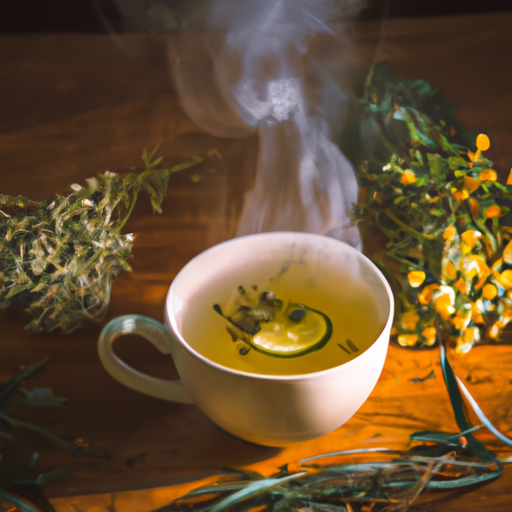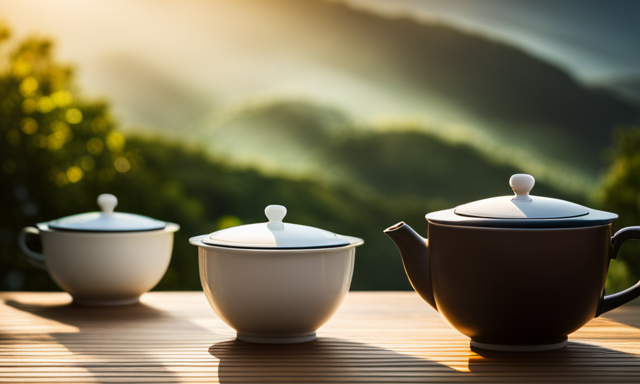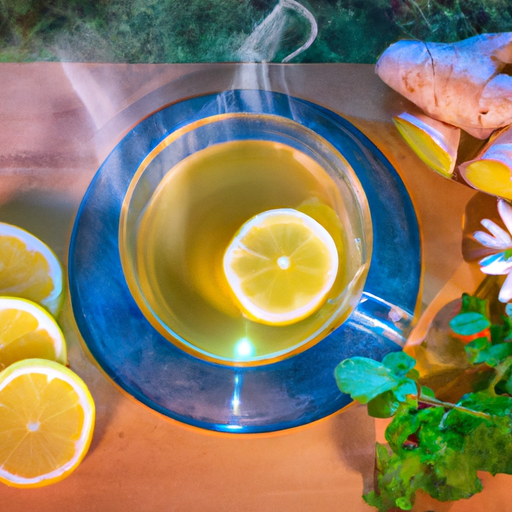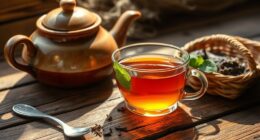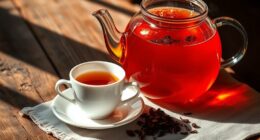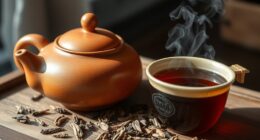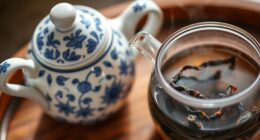Picture this: it’s a chilly winter day, and you find yourself curled up on the couch, snuggled in a warm blanket. But instead of reaching for a cup of hot cocoa, you have a steaming mug of herbal tea in your hands. As the fragrant aroma wafts up, you take a sip, and instantly feel a wave of comfort wash over you.
But this is no ordinary tea – it’s a natural remedy for your pesky cold symptoms. When it comes to finding relief from a cold, herbal teas can be a game-changer. They offer a holistic approach that not only soothes your symptoms but also supports your body’s natural defenses.
In this article, I’ll guide you through the best herbal teas for a cold, backed by evidence and centuries of traditional wisdom. From soothing sinus congestion to boosting your immune system, these natural remedies are here to help you feel better, naturally.
So, grab your favorite mug and get ready to discover the power of herbal teas for a cold.
Key Takeaways
- Peppermint tea soothes sinus congestion and reduces swelling.
- Chamomile tea calms a sore throat, reduces inflammation, and promotes restful sleep.
- Echinacea tea boosts the immune system and helps fight off viruses and bacteria.
- Ginger tea relieves nausea, congestion, and digestive problems.
Peppermint Tea: Soothing Sinus Congestion
If you’re dealing with annoying sinus congestion, peppermint tea can help provide soothing relief! Peppermint tea has been used for centuries to alleviate sinus congestion due to its natural decongestant properties. The menthol in peppermint acts as an expectorant, helping to loosen mucus and relieve nasal congestion. Additionally, peppermint tea has anti-inflammatory properties that can help reduce swelling and discomfort in the sinuses.
To make peppermint tea at home, simply steep 1 teaspoon of dried peppermint leaves in 1 cup of boiling water for about 10 minutes. Strain the leaves and enjoy a warm cup of peppermint tea.
While peppermint tea is generally safe for consumption, it’s important to note that some individuals may experience side effects such as heartburn or allergic reactions. It’s always best to consult with a healthcare professional before incorporating any herbal tea into your daily routine.
Chamomile Tea: Calming Sore Throat
When you have a sore throat, chamomile tea can help soothe and calm your discomfort. Chamomile tea is known for its calming effects and has been used for centuries as a natural remedy for various ailments. It contains compounds that have anti-inflammatory and antioxidant properties, which can help reduce inflammation and boost your immune system. The warm liquid can also provide temporary relief from pain and irritation caused by a sore throat.
In addition to its calming effects, chamomile tea offers several benefits for cold symptoms. It can help relieve congestion, reduce coughing, and promote restful sleep. The herbal tea is also rich in vitamins and minerals that can support your overall health and well-being.
To further illustrate the benefits of chamomile tea, here is a table highlighting five key benefits:
| Benefit | Description |
|---|---|
| Soothes throat | Eases pain and irritation in the throat caused by a cold or sore throat |
| Reduces inflammation | Helps reduce inflammation in the throat and sinuses |
| Boosts immune system | Supports a healthy immune system to fight off cold viruses |
| Relieves congestion | Helps alleviate nasal congestion and sinus pressure |
| Promotes restful sleep | Encourages relaxation and deeper sleep, aiding in overall recovery from cold symptoms |
Incorporating chamomile tea into your cold-fighting routine can provide holistic and natural relief for your sore throat and other cold symptoms.
Echinacea Tea: Boosting Immune System
Looking to boost your immune system? Try incorporating echinacea tea into your routine! Echinacea has long been used as a natural remedy for fighting cold symptoms and strengthening the immune system.
This herbal tea contains several compounds that’ve been shown to have immune-boosting effects, such as flavonoids and polysaccharides. These compounds help to activate the body’s natural defense mechanisms, making it more effective at fighting off viruses and bacteria.
Echinacea tea is also rich in antioxidants, which can help reduce inflammation and support overall health. To prepare echinacea tea, simply steep a teaspoon of dried echinacea leaves in hot water for 10-15 minutes.
It’s important to note that while echinacea tea can be a helpful addition to your cold-fighting routine, it shouldn’t be used as a substitute for medical treatment.
Ginger Tea: Relieving Nausea and Congestion
Ginger tea, known for its soothing properties, can provide relief from nausea and congestion – but did you know it can also help with other ailments? Ginger has long been used as a natural remedy for various health issues, including digestive problems and respiratory conditions. When it comes to relieving nausea, ginger tea is a go-to option. Its compounds can help calm the digestive system and reduce the sensation of queasiness.
Additionally, ginger tea can also help alleviate congestion by opening up the respiratory passages and promoting better airflow. To make ginger tea at home, simply peel and slice fresh ginger, then steep it in hot water for 10-15 minutes. You can add honey or lemon for added flavor.
So next time you’re feeling nauseous or congested, reach for a cup of ginger tea and experience its natural benefits.
Lemon Balm Tea: Fighting Cold Symptoms
To fight off your cold symptoms, try brewing a cup of lemon balm tea – it’s like a soothing, citrusy hug for your immune system. Lemon balm tea has been used for centuries to alleviate cold symptoms and promote better sleep.
The natural compounds found in lemon balm, such as rosmarinic acid and flavonoids, have been shown to have antiviral and immune-boosting properties. These compounds help reduce inflammation and congestion, providing relief from symptoms like coughing and congestion.
Lemon balm also has a calming effect on the nervous system, which can help you relax and get a good night’s sleep. So, when you’re feeling under the weather, reach for a cup of lemon balm tea to not only support your immune system but also promote a restful night’s sleep.
Elderberry Tea: Shortening Duration of Cold
Elderberry tea is known for its ability to shorten the duration of a cold, providing relief and boosting the immune system. This herbal tea has been used for centuries as a natural remedy for various ailments, including colds and flu. Elderberries are rich in antioxidants and vitamins that help strengthen the immune system, making it more resistant to infections.
Studies have shown that elderberry tea can prevent the onset of colds and reduce the severity of symptoms. It works by inhibiting the replication of viruses, thus reducing the duration of illness. Additionally, elderberry tea improves overall immune health by stimulating the production of cytokines, which are essential for immune regulation.
So, if you’re looking for a natural way to fight off colds and improve your immune system, give elderberry tea a try.
Green Tea: Antioxidant Boost for Immunity
Sip on a steaming cup of green tea to give your immune system a powerful antioxidant boost, transporting you to a tranquil garden filled with vibrant green leaves and the refreshing aroma of nature.
Green tea has long been celebrated for its numerous benefits for overall health, and it’s role in boosting immunity is no exception. Packed with antioxidants, green tea helps protect our cells from damage caused by harmful free radicals, which can weaken the immune system. By reducing oxidative stress, green tea supports a strong and resilient immune response, helping to fend off colds and other illnesses.
Additionally, green tea contains catechins, a type of antioxidant that’s been found to enhance the function of immune cells. So next time you’re feeling under the weather, reach for a cup of green tea and let its natural properties work their magic.
Frequently Asked Questions
Are there any potential side effects or risks associated with drinking herbal teas for a cold?
There are potential interactions between herbal teas and other medications, so it’s important to consult with a healthcare professional. When choosing an herbal tea for a cold, consider your symptoms and preferences. It’s always best to take a holistic, evidence-based, and natural approach.
Can herbal teas be used as a standalone treatment for a cold, or should they be used in conjunction with traditional medications?
Herbal teas can be an effective standalone treatment for colds, but they can also be used in conjunction with traditional medications. The effectiveness of herbal teas lies in their natural properties, while traditional medications provide additional relief and targeted treatment.
How often should I drink herbal tea for a cold to experience its benefits?
I’m not a doctor, but herbal tea may take some time to start working for a cold. It can be used as a preventative measure, but it’s important to note that herbal teas may interact with other medications commonly used to treat cold symptoms.
Are there any specific herbal teas that are not recommended for pregnant or breastfeeding women?
There are certain herbal teas that should be avoided during pregnancy or breastfeeding due to potential safety concerns. It’s important to consult with a healthcare professional to determine which herbal teas are safe for you and your baby.
Can children safely consume herbal teas for a cold, and if so, are there any specific teas that are more suitable for them?
Children can safely consume certain herbal teas for a cold. Chamomile and elderberry teas are gentle options. However, it is important to consult with a pediatrician before giving any herbal tea to a child.
Conclusion
In conclusion, when it comes to finding the best herbal tea for a cold, there are several options that can provide relief and support your immune system.
Peppermint tea can soothe sinus congestion, while chamomile tea can calm a sore throat.
Echinacea tea can help boost your immune system, and ginger tea is great for relieving nausea and congestion.
Lemon balm tea can effectively fight cold symptoms, while elderberry tea may help shorten the duration of a cold.
Lastly, green tea with its antioxidant properties can give your immune system a natural boost.
So, next time you have a cold, try incorporating these natural remedies into your routine for a holistic approach to cold relief. Cheers to a healthier you!

